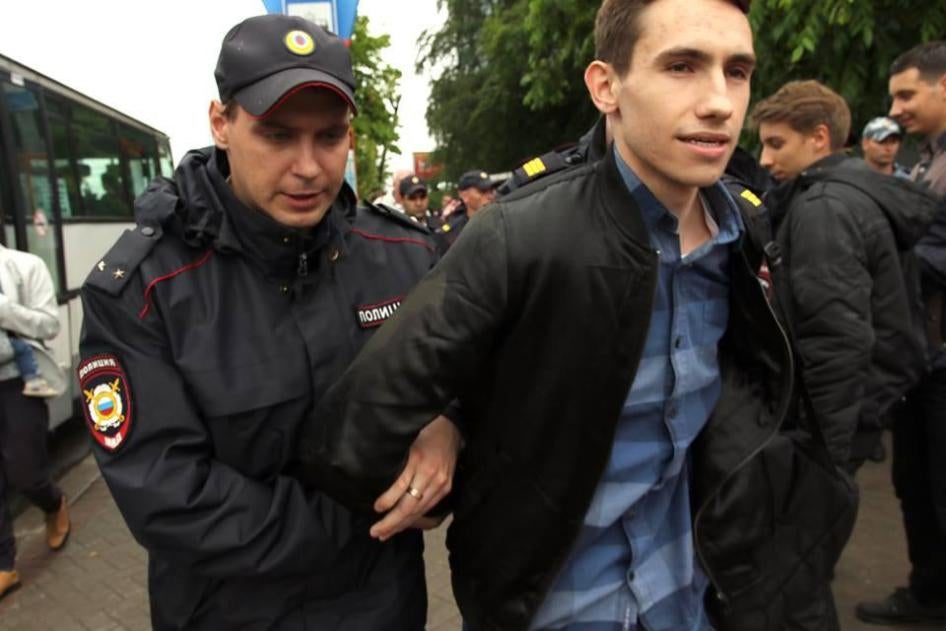Two weeks ago, a third-year law student in Kaliningrad, at the western end of Russia, learned he was being expelled from his university. The management of the Kant Baltic Federal University denied that Oleg Alexeev’s role in organising a public protest on 12 June had anything to do with their decision. However, the sequence of events that led to Alexeev’s expulsion suggests otherwise.
In early June, Alexeev, 21, filed a notification with the Kaliningrad municipality for a public protest in the city centre for 12 June, when major anti-corruption rallies were planned for numerous Russian cities. The authorities refused to authorise it and proposed another, remote site, which the organisers found unacceptable. An official from local anti-extremism police unit called Alexeev and invited him for a “conversation”. The young man refused.
On 8 June, the dean of law school, Oleg Zayachkovsky, asked to see Alexeev in his office. Zayachkovsky was joined by a police official and a supposed representative of the university’s “security department”. The two men refused to introduce themselves by name but listened closely as the dean berated the student and asked him questions about the planned rally. Then they joined the dean in trying to convince Alexeev to move the rally to a park on the outskirts of the city.
Alexeev refused to be intimidated. He secretly recorded the conversation with his smart-phone and shared the audio with journalists. He also went to court to appeal the municipality’s decision about the protest site. On 10 June, the court ruled against him and he criticized the hearing on social networks, saying the court was “full of brazen ignorance”.
On 12 June, 200 to 300 Kaliningrad residents gathered in the city center for a peaceful protest. Police arbitrarily detained dozens of them, including Alexeev. A court fined him 10,000 rubles (about £130) for violating regulations on public gatherings, as happened to hundreds of other peaceful protesters across the country.
During the next few weeks, as Alexeev kept busy with exams and other university work, the audio of his conversation with the dean and two unidentified security officials was getting quite a bit of media coverage. On 10 July, the university suddenly informed Alexeev that he was being expelled. The young man immediately linked it to his activism but the university claimed he had violated the school’s “moral and ethical norms” by paying a “bribe”.
As Alexeev explained to Human Rights Watch, he was indeed among dozens of students at the university who cheated on their physical education requirement by paying someone to change the university’s attendance database to show they had attended physical education classes when they in fact had not. In May, the university discovered this cheating system and Alexeev received a reprimand and had to take on extra physical education classes to make up for it.
Alexeev showed me the explanatory note he filed with the university at the time. He said he wasn’t proud of cheating, especially as cheating did not bode well with his anti-corruption activism, but the university had not even mentioned a possibility of expulsion at the time and he was allowed to continue with his studies. Also, the head of the university’s legal affairs directorate told a local media outlet that although numerous students were involved in that cheating debacle, none of them were punished and that Alexeev’s expulsion had nothing to do with it.
Likewise, the university communications officer told journalists that Alexeev’s cheating earned him a reprimand, but that then he “exacerbated” his situation by publicly expressing his “lack of respect for a court of law” and “unlawfully recording” the conversation he had in the dean’s office. She said that these actions by Alexeev “on top of the reprimand” compelled the university to expel him.
Many Russian students have come under pressure for their participation in the protest rallies this spring and summer. University officials threatened some with expulsion, directly or indirectly. However, when commenting on the issue, Senator Andrey Klishas from the country’s ruling party, United Russia, stated that expelling students or punishing them otherwise for their civic activism was unacceptable. Yet, it seems that Alexeev has indeed become the first student actually to be expelled for his protest activity. Alexeev will try to find justice in a court of law.








